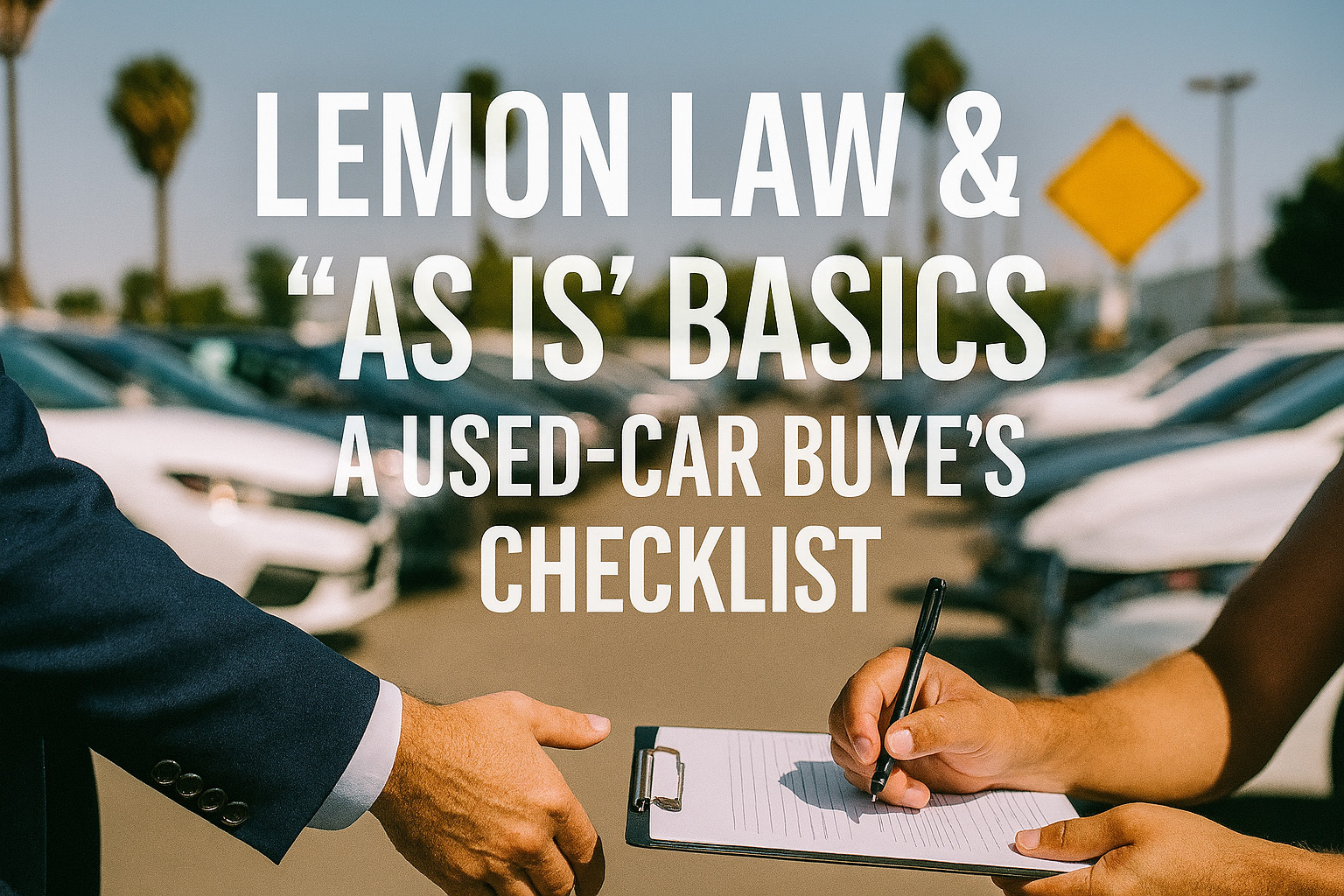Why a Bad Car Is Called a “Lemon”? Lemon Law & “AS IS” Basics: A Used-Car Buyer’s Checklist

Are Used-Car Dealers in the U.S. Practically Like the Yakuza?!
Hello, this is Suzuki from Eco Drive.
You might remember how a scandal involving a certain well-known Japanese used-car dealer recently made big headlines.
The revelations were shocking, and I thought, “Wow, this can happen even in Japan.” But I’ve realized that used-car dealers in the United States can be even more extreme—so that’s what I’d like to talk about today.
Here’s the video version!
The videos embedded in this article are narrated in Japanese, but English subtitles are available.
The second half of the video appears near the bottom of this article.
The Reality of Used-Car Dealers in the United States

Buying a used car in the U.S. can be a very high-risk purchase.
Even after many years living in America and working in the auto industry, I can only describe this market as downright “wild.”
Of course, plenty of dealers put customers first and conduct business honestly.
However, there are also some dealers who don’t hesitate to deceive buyers—practically “yakuza-like” in their tactics.
The Market Is So Bad That Average Consumers Become Experts
Because American consumers are well aware of these conditions, their knowledge of automobiles is surprisingly extensive.
Many people—even from younger generations—know cars almost like professionals.
This stems from parents teaching their children “Don’t get scammed,” combined with plenty of self-study.
When Americans buy a car, they scrutinize every single word of the contract. They ask for the paperwork in advance, read it thoroughly until they’re satisfied, and only then commit to the purchase.
Such meticulousness is an essential form of self-protection against being deceived.
If you ever buy a used car in the United States, be sure to gather information beforehand and tread carefully.
You Can Take a Used Car to Your Mechanic Before Buying
Perhaps because of these circumstances, the law allows buyers to bring a car to their own trusted mechanic for an inspection before finalizing the purchase.
I was genuinely surprised when I first heard this.
Since I didn’t know about it, I once refused a customer who wanted to show a car to their mechanic when I was trying to sell in the U.S.
But in reality, this practice is completely legal—and a savvy way for customers to protect themselves.
Protect Yourself So You Don’t Get Scammed
When buying a car in the United States, it’s crucial to safeguard your own interests.
Some used-car dealers will sell accident vehicles, roll back odometers, quote prices that differ from the ads, or even pass off damaged cars as “brand-new.”
There are even stories of dealers taking a down payment and then selling the car to another customer.
In short, dealers prioritize whichever sale brings them the most profit.
Carefully Reviewing the Contract Is Absolutely Crucial
Under these circumstances, it’s vital to equip yourself with solid knowledge and fully understand every clause of the contract.
Taking action within the bounds of the law, when needed, is the key to avoiding scams.
Some Japanese customers have come to me with their contracts, worried they may have been deceived.
Fortunately, there are cases where the law allows the contract to be canceled and a refund obtained.
Are Car Dealers Selling Lemons?

Fifteen years ago, when I had just set foot in the United States, I saw a strange banner in front of a used-car dealership that I still remember vividly.
The banner read “We do not have a lemon,” with a picture of a lemon and a big red X through it.
This literally means “We don’t sell lemons,” but when I first saw it I was baffled.
I wondered, “Why would a car dealer be selling lemons (the fruit)?”
Lemons Look Good Outside but Are Sour Inside, Meaning…
Because I was so puzzled, I asked an American friend about it.
He explained that “lemon” is slang for a bad car—a vehicle you should never buy.
A “lemon car” looks attractive on the outside but is practically unusable in reality, and I learned there is even a consumer-protection law called the Lemon Law.
This law was enacted to protect buyers who end up purchasing defective vehicles.
(Just as a real lemon looks nice but tastes sour, a car may look great yet leave you with a “sour” experience once you drive it.)
In Other Words, Some Dealers Do Sell Lemon Cars
The very existence of such banners means there are dealers who routinely sell lemons.
Some dealers buy lemon cars cheaply and resell them as if they were problem-free, earning hefty profits.
But for consumers, that’s disastrous—these are cars you must never buy.
By declaring “We don’t sell lemons,” the dealer was trying to win consumers’ trust with that banner.
Don’t Be Fooled by Appearances—Inspect the Condition Thoroughly
When purchasing a car, it’s essential not to be swayed by looks alone; thoroughly investigate the vehicle’s history and current condition.
Understanding consumer-protection laws like the Lemon Law also equips you to handle any issues that may arise.
The U.S. used-car market is still very much a “buyer beware” environment, but knowing your rights and acting wisely will help you steer clear of trouble.
Cars Sold “AS IS” Cannot Be Returned

Another factor in the U.S. used-car market is the unique sales condition known as “AS IS,” which can cause all kinds of problems.
“AS IS” means the vehicle is sold “as it is,” and, in principle, cannot be returned after purchase.
The United States may be the land of easy returns, but used cars are often sold under this non-returnable condition.
Whether the car you’re considering is listed “AS IS” is critical, so be sure to confirm this before buying.
The Commission-Only Pay Structure for Salespeople Makes Things Even Worse
What makes this situation even more problematic is that salespeople are paid entirely on commission.
Because their livelihood depends directly on selling cars, there is no shortage of salespeople who will use any means necessary to close a deal.
Unfortunately, foreigners and international students are particularly prone to being scammed.
The Ironic Situation of Learning English Just to Avoid Being Scammed
Because of this climate, many international students—including Japanese students—ironically end up learning English through the process of buying a car.
By negotiating with salespeople and poring over contracts, they acquire real-world English skills.
Seeing this firsthand inspired me to create my current company so that people pursuing their dreams in America wouldn’t stumble over such unfair obstacles.
The United States is a car-centric society, and purchasing a vehicle is a path most people can’t avoid.
For that reason, problems in the used-car market can affect not just the act of buying a car, but an international student’s entire life in America.
Since COVID, Unscrupulous Dealers Are Being Weeded Out—But…
The U.S. used-car industry has undergone major changes since the pandemic.
With supply chains disrupted, the number of available vehicles dropped and prices soared.
This climate accelerated the shake-out: dealers who treated customers fairly survived, while those engaged in shady practices were driven out.
Today, the spread of the internet means customer feedback carries more weight than ever.
Online reviews and reputations have become a key yardstick for shoppers when choosing a dealer.
The Online Era Makes It Easier for Good Dealers to Survive
This shift underscores how crucial it is for dealers to protect their reputations.
Dealers who rely on repeat customers and referrals continue to deliver true value to their clients.
Meanwhile, those engaging in shady business practices are being weeded out by the internet’s increasing transparency and consumers’ improved research skills.
Still—Never Forget to Protect Yourself!
Even though more dealers are doing business ethically nowadays, customers still need to understand the information thoroughly and safeguard their own interests.
Read every line of the contract carefully, and ask questions about anything unclear.
When dealing with a dealer, knowing your rights—and defending them—is absolutely essential.
With these changes, I hope the environment will keep improving so consumers can purchase cars with greater peace of mind.
Watch the Second-Half Video Here
Enjoy it together with a stroll through Universal Studios Hollywood!
Our Services
We offer comprehensive automotive solutions—buy, sell, rent, and repair in one place.
Car Sales
Browse our lineup of quality used cars with transparent pricing and up to a two-year warranty on select models.
View InventoryAuto Repair
Get expert service from our certified Toyota Master Mechanic. We primarily service Toyota vehicles.
Schedule ServiceTrade-in / Sell
We pay top dollar for your vehicle—especially hybrids. Count on fair, transparent appraisals.
Get EstimateCar Rentals
Choose between fuel-saving hybrid rentals and a Tesla with Full Self-Driving Capability—both at competitive rates.
Reserve Now





